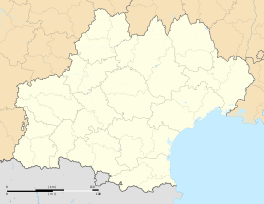Assas
| Assas | ||
|---|---|---|
|
Saint-Martial church | ||
| ||
 Assas | ||
|
Location within Occitanie region  Assas | ||
| Coordinates: 43°42′10″N 3°54′00″E / 43.7028°N 3.9°ECoordinates: 43°42′10″N 3°54′00″E / 43.7028°N 3.9°E | ||
| Country | France | |
| Region | Occitanie | |
| Department | Hérault | |
| Arrondissement | Montpellier | |
| Canton | Castries | |
| Intercommunality | Pic-Saint-Loup | |
| Government | ||
| • Mayor (2008–2014) | Jacques Graut | |
| Area1 | 19.11 km2 (7.38 sq mi) | |
| Population (2008)2 | 1,527 | |
| • Density | 80/km2 (210/sq mi) | |
| Time zone | CET (UTC+1) | |
| • Summer (DST) | CEST (UTC+2) | |
| INSEE/Postal code | 34014 / 34820 | |
| Elevation |
59–164 m (194–538 ft) (avg. 85 m or 279 ft) | |
|
1 French Land Register data, which excludes lakes, ponds, glaciers > 1 km² (0.386 sq mi or 247 acres) and river estuaries. 2 Population without double counting: residents of multiple communes (e.g., students and military personnel) only counted once. | ||
Assas is a commune in the Hérault department in southern France.
Geography
Located just north of Montpellier, Assas lies near Saint-Vincent de Barbeyrargues, Guzargues, Clapiers, Jacou, Castries and Teyran. The region near Assas is primarily scrubland, but it is watered by a number of streams and brooks and has a small wooded area that produces mushrooms in the fall.
The village of Assas is organized around the Château d'Assas, located on a hill overlooking the small but quaint old village.

Population
| Historical population | ||
|---|---|---|
| Year | Pop. | ±% |
| 1962 | 352 | — |
| 1968 | 352 | +0.0% |
| 1975 | 506 | +43.8% |
| 1982 | 815 | +61.1% |
| 1990 | 992 | +21.7% |
| 1999 | 1,305 | +31.6% |
| 2008 | 1,527 | +17.0% |
The inhabitants are called Assadins.
Viticulture
The region containing Assas is a productive wine-making area, and has the appellation Grès de Montpellier. This is part of the AOC Coteaux du Languedoc designation.
Sights
- Château d'Assas, an 18th-century folie montpellierraine, designed by the architect Jean-Antoine Giral (1700–1787), was built in 1759/1760 on the ruins of a feudal castle. It is a private residence, but can be toured either by appointment or on national holidays. A historic 18th century harpsichord is preserved in the Château, a favoured instrument of harpsichordist Scott Ross (1951–1989), who died in Assas. At the beginning of the 1920s, Sir Patrick Geddes (born Ballater, Scotland 2 October 1854, died Montpellier, France 17 April 1932), the Scottish botanist, bought the Château d'Assas to set up a centre for urban studies, as an extension of the Collège des Ecossais which he founded in Montpellier in 1890.
The château was used as a set in the filming of La Belle Noiseuse, a film by Jacques Rivette (1991). - A church of the 11th or 12th century, completely restored at the beginning of the 21st century.
- Remains of the 10th or 11th century fortifications.
- Old village.
See also
References
External links
| Wikimedia Commons has media related to Assas (Hérault). |
- Commune d'Assas, official website
- Map of France locating Assas
- Map of Assas on Mapquest
- Assas photos – not an official site
.svg.png)